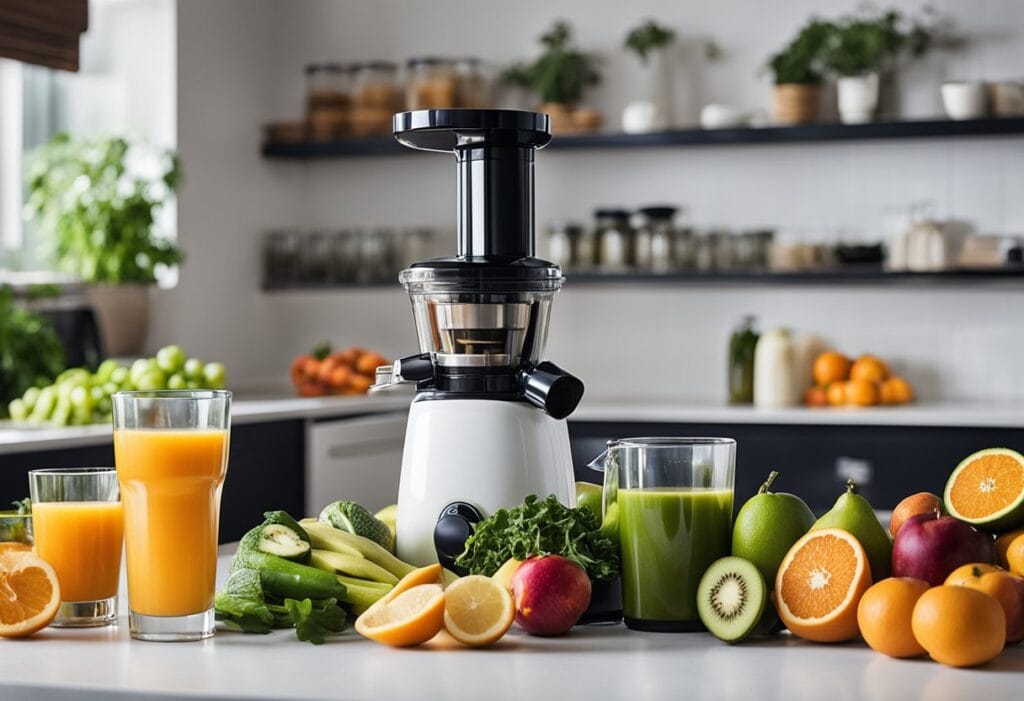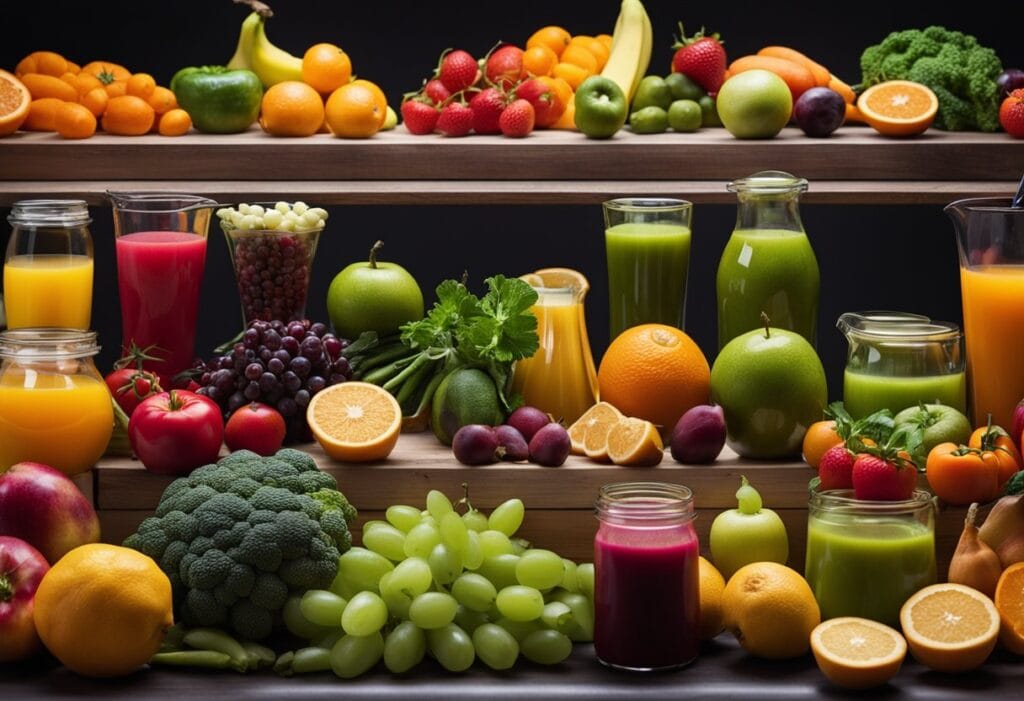Juice cleanses have become increasingly popular in recent years as a way to detoxify the body and lose weight. However, there is a lot of conflicting information about whether juice cleanses are truly beneficial for our health. In this article, we will explore the truth about juice cleanses and what you need to know before embarking on one.

Understanding Juice Cleanses Juice cleanses involve consuming only fruit and vegetable juices for a period of time, usually anywhere from one to three days. The idea behind juice cleanses is that by eliminating solid food from our diet and consuming only liquids, we can help our body to detoxify and rid itself of harmful toxins. However, there is little scientific evidence to support the idea that juice cleanses are effective for detoxification purposes.
Nutritional Aspects of Juice Cleanses One of the main concerns with juice cleanses is that they can be very low in calories and protein, which are both important for maintaining muscle mass and overall health. While fruits and vegetables are certainly nutritious, they are not a complete source of nutrients and can lead to deficiencies if consumed exclusively for an extended period of time. Additionally, some juice cleanses may be high in sugar due to the natural sugars found in fruits, which can lead to spikes in blood sugar levels.
Overview
Key Takeaways
- Juice cleanses involve consuming only fruit and vegetable juices for a period of time, usually one to three days, with the goal of detoxifying the body and losing weight.
- There is little scientific evidence to support the idea that juice cleanses are effective for detoxification purposes, and they may be low in calories and protein, which are important for maintaining muscle mass and overall health.
- Balanced alternatives to juice cleanses include eating a variety of whole, nutrient-dense foods, staying hydrated, and getting regular exercise.
Understanding Juice Cleanses
What Is a Juice Cleanse?
A juice cleanse is a type of diet that involves consuming only juices made from fruits and vegetables for a certain period, usually one to three days. The goal of a juice cleanse is to detoxify the body by eliminating toxins and promoting weight loss.
Juice cleanses are often marketed as a quick and easy way to lose weight, boost energy levels, and improve overall health. However, there is little scientific evidence to support these claims. In fact, some experts argue that juice cleanses can do more harm than good.
History and Popularity
The idea of using juice as a way to cleanse the body dates back to ancient civilizations, including the Egyptians and Greeks. In recent years, juice cleanses have become increasingly popular, with many celebrities and influencers promoting them on social media.
The popularity of juice cleanses can be attributed to a growing interest in health and wellness. Many people believe that the modern diet, which is often high in processed foods and sugar, can lead to a buildup of toxins in the body. Juice cleanses are seen as a way to counteract these effects and improve overall health.
While juice cleanses may offer some benefits, it is important to approach them with caution. Drinking only juice for an extended period can lead to nutrient deficiencies and may not provide enough energy to sustain physical activity. Additionally, the liver and kidneys are responsible for detoxifying the body, and there is little evidence to suggest that juice cleanses are necessary or effective in this regard.
In summary, juice cleanses involve consuming only juice made from fruits and vegetables for a certain period. While they have a long history and are popular among health enthusiasts, there is little scientific evidence to support their benefits. It is important to approach juice cleanses with caution and consult a healthcare professional before starting one.
Nutritional Aspects of Juice Cleanses
Juice cleanses have become a popular way to detoxify the body and lose weight. However, there are some nutritional aspects that need to be considered before starting a juice cleanse.
Vitamins and Minerals
One of the main benefits of juice cleanses is that they provide a high amount of vitamins and minerals. Fruits and vegetables used in juice cleanses are rich in vitamins A, C, and K, as well as minerals such as potassium and magnesium. However, it is important to note that some vitamins and minerals are lost during the juicing process. For example, vitamin C is sensitive to heat and can be destroyed during the juicing process.
Lack of Fiber and Protein
Fiber is an essential nutrient that is found in fruits and vegetables. However, during the juicing process, the fiber is removed, which can lead to digestive problems such as constipation. Additionally, protein is an important nutrient that is necessary for building and repairing tissues in the body. Juice cleanses typically lack protein, which can lead to muscle loss.
Sugar Content in Fruit Juices
Fruit juices are high in natural sugars, which can cause a spike in blood sugar levels. This can lead to an energy crash and hunger pangs. It is important to choose fruits that are low in sugar, such as berries and green apples, to avoid these negative effects.
In conclusion, while juice cleanses can provide a high amount of vitamins and minerals, they can also lack essential nutrients such as fiber and protein. Additionally, the high sugar content in fruit juices can cause negative effects on the body. Before starting a juice cleanse, it is important to consider these nutritional aspects and to consult with a healthcare professional.
Potential Health Implications

Juice cleanses have gained popularity as a way to detoxify the body and promote weight loss. However, there are potential health implications to consider before embarking on a juice cleanse.
Weight Loss and Gain
Many people turn to juice cleanses as a way to lose weight quickly. While it is true that juice cleanses can lead to short-term weight loss, this weight loss is often due to water weight and muscle loss rather than fat loss. Once the cleanse is over and normal eating patterns resume, the weight lost during the cleanse is often regained.
Impact on Blood Sugar and Diabetes
Juice cleanses are often high in sugar due to the natural sugar content of fruits and vegetables. This can lead to a spike in blood sugar levels, which can be problematic for individuals with diabetes or insulin resistance. In addition, juice cleanses are often low in protein and healthy fats, which can further exacerbate blood sugar imbalances.
Effects on Digestive System
Juice cleanses can have a significant impact on the digestive system. While some people report feeling more energized and less bloated during a cleanse, others experience constipation, diarrhea, and other digestive issues. This is because juice cleanses are often low in fiber, which is essential for digestive health. In addition, the high sugar content of many juice cleanses can disrupt the balance of bacteria in the gut, which can further exacerbate digestive issues.
In conclusion, while juice cleanses may seem like a quick and easy way to detoxify the body and promote weight loss, there are potential health implications to consider. Before embarking on a juice cleanse, it is important to consult with a healthcare professional to determine if it is safe and appropriate for your individual needs.
The Risks and Drawbacks

Juice cleanses have gained popularity in recent years as a way of detoxifying the body and promoting weight loss. However, there are several risks and drawbacks associated with juice cleanses that should be considered before starting one.
The Truth About Detoxification
One of the main claims of juice cleanses is that they help to detoxify the body. However, there is little scientific evidence to support this claim. The body has its own natural detoxification system, which includes the liver, kidneys, and lymphatic system. These organs work together to remove toxins from the body. While juice cleanses may provide some temporary relief from symptoms such as bloating and constipation, they are not a substitute for the body’s natural detoxification system.
Nutritional Deficiencies
Juice cleanses involve consuming only juices from fruits and vegetables, which can lead to nutritional deficiencies. Juices are often high in sugar and low in fiber, protein, and healthy fats. This can lead to a lack of essential nutrients, such as vitamins, minerals, and antioxidants. In addition, juice cleanses can cause a drop in blood sugar levels, which can lead to fatigue, dizziness, and headaches.
Psychological and Behavioral Concerns
Juice cleanses can also have psychological and behavioral effects. They may promote an unhealthy relationship with food and lead to disordered eating patterns. Juice cleanses can also promote weight gain in the long term, as they may slow down the body’s metabolism and lead to a loss of muscle mass.
In conclusion, while juice cleanses may provide some short-term benefits, such as weight loss and improved digestion, they are not a sustainable or healthy way to promote long-term health. The risks and drawbacks associated with juice cleanses should be carefully considered before starting one. It is important to maintain a balanced and varied diet that includes a variety of fruits, vegetables, whole grains, and lean proteins to support overall health and well-being.
Balanced Alternatives to Juice Cleanses

When we think of detoxing or cleansing our bodies, juice cleanses are often the first thing that comes to mind. However, there are other balanced alternatives to juice cleanses that can help us achieve our health goals without depriving our bodies of essential nutrients.
Incorporating Whole Foods
One alternative to juice cleanses is to incorporate whole foods into our diet. Whole foods are minimally processed and contain a variety of essential nutrients that our bodies need to function properly. By incorporating a variety of fruits, vegetables, whole grains, and lean proteins into our diet, we can nourish our bodies while still promoting health and well-being.
The Role of a Balanced Diet
Another alternative to juice cleanses is to focus on maintaining a balanced diet. A balanced diet includes a variety of nutrients that our bodies need to function properly, including carbohydrates, proteins, fats, vitamins, and minerals. By focusing on a balanced diet, we can ensure that our bodies are getting the nutrients they need to stay healthy and strong.
Consulting Health Experts
Finally, consulting with health experts, such as registered dietitians, can provide us with personalized guidance on how to achieve our health goals. Health experts can help us develop a personalized nutrition plan that takes into account our unique needs and goals. They can also provide us with guidance on how to incorporate whole foods into our diet and maintain a balanced diet over the long term.
Overall, there are many balanced alternatives to juice cleanses that can help us achieve our health goals without depriving our bodies of essential nutrients. By incorporating whole foods into our diet, focusing on a balanced diet, and consulting with health experts, we can promote health and well-being in a way that is sustainable and effective.
If you want to learn more about Juice Cleanses, have a look at Health benefit of vegetable/fruit juice-based diet: Role of microbiome










